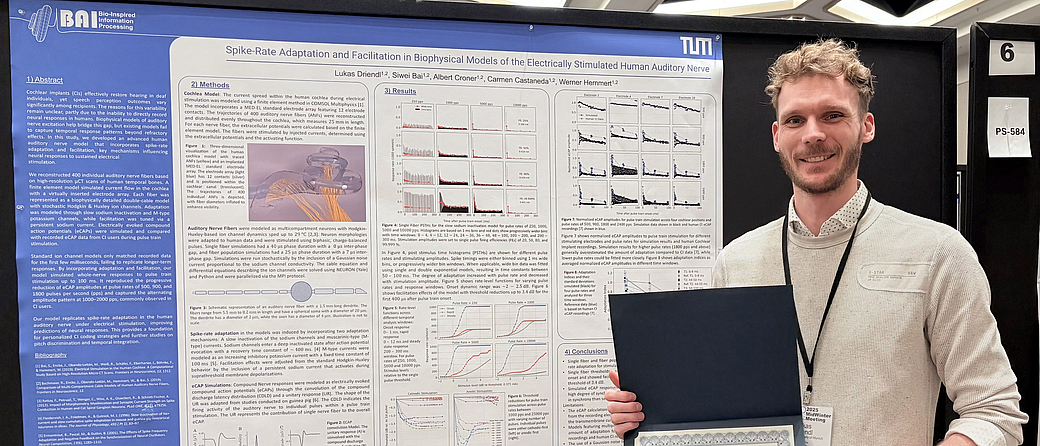Sunshine, science, and simulation: At the MidWinter Meeting of the Association for Research in Otolaryngology (ARO) in Orlando, Lukas Driendl, doctoral candidate in the research group “Bio-Inspired Information Processing”, spent an inspiring week diving into the latest in hearing research. He exchanged ideas with international colleagues and explored how computational models can help us better understand real-world hearing data. Even the evening searches for dinner turned into small adventures and unexpected brainstorming sessions.
In February, I had the chance to attend the 48th Annual ARO MidWinter Meeting in Orlando, Florida – a major conference in the field of hearing research. Kicking off with a preconference symposium on Menière's disease, a condition affecting the inner ear that causes vertigo, hearing loss, and tinnitus, the week was packed with fascinating talks on cochlear implants, acoustic hearing, modeling and simulations, and machine learning in auditory research.
Poster session: How the auditory nerve responds to electrical stimulation
I presented my work during one of the poster sessions and was honored to receive an ARO Travel Award for my submitted abstract. My research focuses on simulating how the auditory nerve responds to electrical stimulation, such as that from a cochlear implant. This topic fascinates me because understanding these neural responses could help explain, for example, why most cochlear implants perform well in quiet environments but struggle in noisy settings. In the long term, this research could support efforts to improve the performance of cochlear implants and their ability to restore hearing.
At the conference, I had many engaging discussions on how to refine these models and better align them with psychoacoustic data, which measures how individuals actually perceive and process sounds. I was especially interested in exploring how simulation results can help explain complex, and sometimes puzzling, findings from measurements in both cochlear implant users and individuals with normal hearing.
Inspiring discussions under the sunshine
Beyond the science, the setting could not have been more different from the cold February weather of Munich – sunny skies, palm trees, and poolside conversations. While the Orlando area around the conference was not particularly walking-friendly, and dinner hunts often turned into 45-minute adventures, the resulting discussions were some of the most inspiring of the week.
A canceled return flight due to a strike at Munich Airport unexpectedly gave us one more day to enjoy the Florida sun and finally explore the hotel pool we had barely had time to notice before. A fitting end to a week full of research, new connections, and bright ideas under the sunshine.
Text by Lukas Driendl
More Information
Contact Media Relations
MIBE Media Relations
presse@bioengineering.tum.de
